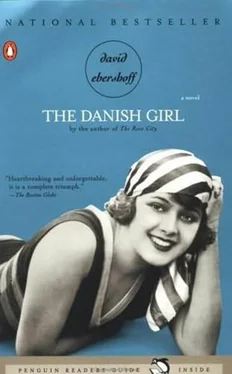Dr. McBride’s office was more like a lawyer’s than a doctor’s. His desk was double-pillared and inlaid with a sheet of green leather. There was a wall of bookshelves, and a row of oak filing cabinets. By the window a medical dictionary was open on a stand. While Einar told Dr. McBride about Lili, the doctor sat blank-faced, pushing his eyeglasses up and down the bridge of his nose. When the telephone rang, Dr. McBride ignored it and urged Einar to continue. “What’s the longest you’ve lived as Lili?” he asked.
“Over a month,” Einar said. “Last winter she was here for a long time.” Einar thought about the past winter, when more often than not he would go to bed and have no idea who he would be when he woke in the morning. One night Lili and Greta found themselves held up at knife-point after leaving the Opéra. The thief was a little man in a black pea coat, and his knife didn’t look especially sharp in the winter moonlight. But he waved it at them and demanded their purses. The man hadn’t shaved in a few days, and he kept kicking the ground with one foot, saying, “I’m serious, mademoiselles. Don’t think I’m not serious.” When Lili moved to hand over her purse, Greta tried to take her wrist, saying, “Lili, don’t.” But the man snatched the purse, and then he was lunging for Greta’s, who cried, “Oh no you don’t!” Greta began to run down the street, toward the Opéra, which was gold in the night. Lili remained against the wall, the thief in front of her. His foot struck the sidewalk again, and he seemed to be trying to think of what to do next. Greta was a block away when she turned around. Lili could only make out her silhouette: her fists on her hips, her feet apart. Then she started walking back toward Lili and the thief. The man smiled nervously. “She ’s crazy,” he said, his foot kicking the sidewalk. He turned his wrist so that now his knife, which wasn’t much more than a piece of flatware, was pointing down. Then he began to run away from Greta.
“Do you think of Einar when you are Lili?” Dr. McBride asked.
“Not at all.”
“But you think of Lili when you are Einar?”
“Yes.”
“What do you think about?” He removed the cap from his pen and placed the open instrument on a blank sheet of paper.
“Most of the time I just think her thoughts,” he said. Einar explained that if he were eating an apple tart sprinkled with cinnamon he’d wonder if he should save a slice for Lili. If he were arguing with the butcher, who tended to press his thumb against the scale, Einar would wonder if Lili would argue. He would convince himself that she wouldn’t take on the butcher, who was skinny and handsome with spiky blond hair; and so, mid-sentence, Einar would apologize and ask the butcher to continue wrapping his lamb.
Dr. McBride pushed up his eyeglasses.
Across the street at the café, Carlisle was waiting. Einar now thought of him, reading his Baedeker, pulling the pencil from behind his ear and marking a recommended site. Just then he was probably finishing his coffee and checking his watch.
“And how do you feel about men?” Dr. McBride asked. “Do you hate them?”
“Hate men?”
“Yes.”
“Of course not.”
“But it would be natural for you to hate men.”
“But I don’t.”
“And Lili? How does she feel about men?”
“She doesn’t hate men.”
Dr. McBride poured some water from a silver pitcher. “Does she like men?”
“I’m not sure I know what you mean.”
The doctor took a sip. Einar could see the impression his lips left on the rim of the glass, and suddenly Einar realized he was thirsty.
“Has she ever kissed a man?”
Einar was trying to think of a way to ask for a glass of water, but it seemed impossible. He thought perhaps he should simply stand up and pour himself one, but that felt impossible too. And so Einar just sat there, and he felt like a child in Dr. McBride ’s chair, which was covered in an itchy yellow wool.
“Mr. Wegener, I’m only asking because-”
“Yes,” Einar said. “Yes, she ’s kissed a man.”
“Did she like it?”
“You’ll have to ask her.”
“I thought I was asking her.”
“Do I look like Lili?” Einar said. “Do I look like a woman to you?”
“Not really.”
“Well, then-”
Dr. McBride’s telephone rang, and together they stared at its black receiver, which trembled with each ring. Finally it went silent.
“I’m afraid you are a homosexual,” Dr. McBride eventually said. He capped his pen with a little click.
“I don’t think you understand.”
“You’re not the first person this has happened to,” Dr. McBride said.
“But I’m not a homosexual. That isn’t my problem. There’s another person living inside me,” Einar said, rising from the chair. “A girl named Lili.”
“And it breaks my heart,” Dr. McBride continued, “when I have to tell men like you that there’s nothing I can do for them. As a black Irishman, I find it very sad.” He sipped from his waterglass, his lips clamping on the rim. Then he stood, moving around to the front of his desk. His hand moved to Einar’s shoulder, nudged him to the door. “My only advice is that you restrain yourself. You’re going to have to always fight your desires. Ignore them, Mr. Wegener. If you don’t… well, then, you’ll always be alone.”
Einar met Carlisle at the café. He knew Dr. McBride was wrong. Not so long ago Einar might have believed the doctor and sulked away in pity for himself. But Einar told Carlisle that it had been a waste of time. “Nobody is going to understand me,” he said. “I don’t see the point of any of this.”
“But that’s not true,” Carlisle protested. “We need to find you the right doctor. That ’s all. So Dr. McBride doesn’t know what he’s talking about. So what? That doesn’t mean you should give up.”
“Why are you doing this?”
“Because you’re unhappy.”
“Yes, but why?”
“Because of Greta.”
A few days later, Carlisle drove Einar to the Etablissement Hydro thérapique, a hospital known for its care of nervous maladies. The hospital was out toward Meudon, hidden from the road behind a grove of sycamore trees. There was an attendant at the gate, who pushed his face into the car and asked whom they were visiting. “Dr. Christophe Mai,” Carlisle said. The attendant eyed them, biting his lip. He passed them a clipboard to sign.
The hospital was a new building, a deep box of cement and glass. It was shaded by more sycamores, and plane trees scarred in the trunk. Steel grates covered the windows on the ground floor, their padlocks bright in the sun.
They had to sign another sheet of paper at the front entrance, and a third when they finally arrived at Dr. Mai’s office. A nurse, a woman with white curls, told them to wait in a little room that, once she closed the door behind her, felt securely sealed.
“I didn’t tell Greta where we were going today,” Carlisle said. A few days earlier Einar had overheard them talking about him. “He doesn’t need to see a psychiatrist,” she had said, her voice traveling via the crack beneath the door. “Besides, I think I know someone who can help him. And he isn’t a psychiatrist. This is someone who can really do something.” Then her voice fell, and the rest Einar failed to hear.
Dr. Mai’s office was brown and smelled of cigarettes. Einar could hear feet shuffling outside in the hallway. There was something so unpleasant about the hospital that a little sensation rose up inside him, telling him that this was where he belonged. In the brown carpeting, there were tracks from carts, and Einar began to imagine himself strapped to a cart that would wheel him into the deepest part of the hospital, from which he would never return.
Читать дальше












